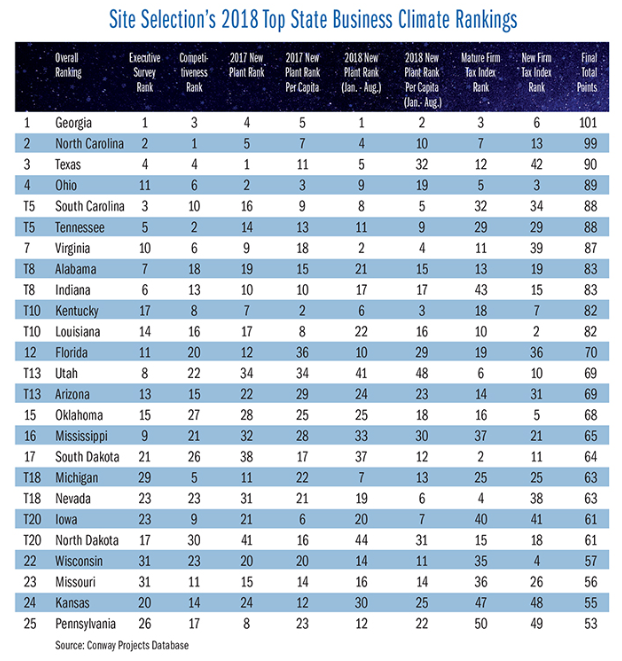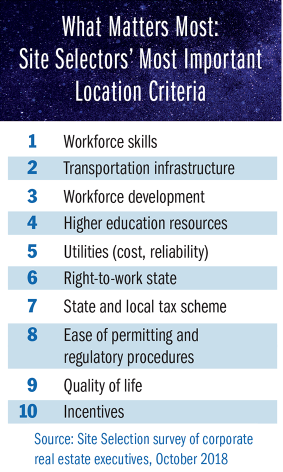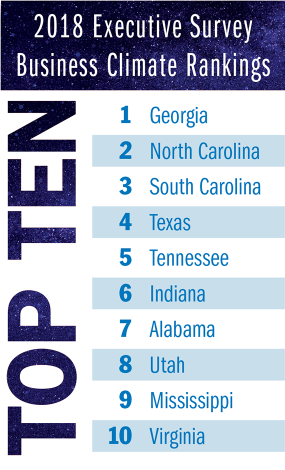An Oasis of Opportunity
December 4, 2018
Site Selection Magazine - Mark Arend
With six consecutive Top Business Climate wins to his credit, Gov. Nathan Deal reflects on overcoming state transportation challenges, how to invest wisely in education and workforce resources, and his hope that Georgia’s business climate benefits businesses and their workers long after he’s gone.
Talk about an opportunity zone. The term has a specific definition in the context of economic development, as the article beginning on page 80 explains. But the entire state of Georgia could be considered a zone of opportunity for companies seeking the nation's best business climate — year after year. A string of six consecutive first-place finishes means Georgia's performance in this annual exercise in any year since 2013 was not an anomaly. It's a pattern, and one that outgoing, term-limited Governor Nathan Deal helped set in motion.
Certain ingredients were already in the bowl when the governor came to office in 2011: the world's busiest airport with direct access to business destinations around the globe; bustling seaports; a diversified economy in the Atlanta area and statewide; top universities; and an already business-friendly environment thanks in part to his predecessor, two-term Gov. Sonny Perdue, now the U.S. Secretary of Agriculture.

What did Chef Deal add to the mix? Among other things, a commitment to fiscal soundness, economic predictability, smart investment in education and transportation and to championing the state's agriculture, film production and other key industries. He elaborated on these points in his last such interview with Site Selection in mid-October, not long after Hurricane Michael had ravaged a large swath of the state with devastating effects (losses north of $2.5 billion, conservatively) on its cotton, peanut, pecan, timber and other crops.
We covered that topic first.
"We have numerous people working to make sure that debris is removed from our roadways so utility crews can get in and restore power, especially to vulnerable institutions like hospitals," noted the governor. "Fortunately, we did not have flooding from this storm. But the high winds passed through the heart of our agricultural community. We are trying to get people back to normal as quickly as possible."
Trains and Boats and Planes
A big part of Georgia's business climate is transportation-based. Could Georgia do as well in this ranking without Hartsfield-Jackson International Airport with its fortress Delta Airlines hub and global passenger and cargo reach? No way. Countless businesses, large and small, are in Georgia thanks to that connectivity. Interstate highways in the Atlanta metro may be a daily thorn in commuters' sides, but investment in those, including reversible express routes that bypass local exits, is helping. By the way, it's not Atlanta's fault — nor its Interstate highways' — that the occasional livestock truck overturns during rush hour, sending cows, pigs or chickens onto the highway. That can happen anywhere.
"Infrastructure and transportation are essential ingredients to having a successful state for business," says Gov. Deal. "Our focus there has been to make sure we provide the necessary things government can and should do to make the business community grow and prosper."
 The Port of Savannah has record container volumes year after year and efforts to deepen the Savannah River and the port are ongoing. "The state has put in more than $300 million as its share of that cost, and the federal government is contributing its share, and we're hopeful that project will be complete by 2020 or 2021," the governor reports. "The Port of Brunswick is the second busiest auto port, and we have made some changes there to expand space for those vehicles. As we see an increase in automotive manufacturing and parts suppliers locating in Georgia, having access to the port for products coming in or going out is very important, and Brunswick is the key to that. The ports are responsible for almost $129 billion in economic impact, and exports have grown by 28.8 percent since I took office in 2011. Thousands of people are working across our state as a result of having robust ports."
The Port of Savannah has record container volumes year after year and efforts to deepen the Savannah River and the port are ongoing. "The state has put in more than $300 million as its share of that cost, and the federal government is contributing its share, and we're hopeful that project will be complete by 2020 or 2021," the governor reports. "The Port of Brunswick is the second busiest auto port, and we have made some changes there to expand space for those vehicles. As we see an increase in automotive manufacturing and parts suppliers locating in Georgia, having access to the port for products coming in or going out is very important, and Brunswick is the key to that. The ports are responsible for almost $129 billion in economic impact, and exports have grown by 28.8 percent since I took office in 2011. Thousands of people are working across our state as a result of having robust ports."
In late October, Georgia Ports Authority (GPA) Executive Director Griff Lynch detailed Fiscal Year 2018 successes, including 630,000 units of cars, trucks and tractors handled through Georgia terminals.
"The Port of Brunswick achieved a solid performance across all cargo categories over the last fiscal year," Lynch said. "As GPA adds new terminal space, we will expand our service area in the Southeast and beyond."
During the event hosted by the Brunswick Golden Isles Chamber of Commerce, Lynch outlined a series of infrastructure projects that will increase capacity and provide new opportunities in Roll-on/Roll-off cargo handling. Over the next 12 months, GPA will add 60 dockside acres to the Ro/Ro operation. The new space will increase car storage by 8,250 spaces.
About that Traffic …
What does this mean for Georgia's Interstate highways, which next to rail are the chief arteries from the ports to points west and vice versa? The Interstates in and around Atlanta are so clogged at times the region loses points in the quality-of-life and logistics categories.
Atlanta traffic?
"It's a sign of growth," says the governor, returning the serve with more than a little topspin. But it's a fair point. More than 700,000 private-sector jobs have come into being and Georgia has jumped from the 10th most populous state to 8th most populous since he took office.
"With that comes traffic and congestion," he points out. "That's why the Transportation Act of 2015 was so important. It was the first time in 40 years that the state of Georgia had looked at how we finance infrastructure improvements. We're making progress on completing the 11 major projects that were part of that, most of which were Interstate-related. The reversible express lanes on I-75 south of Atlanta and now on the north side, too, are proving to be very successful in traffic congestion relief." Other measures include extending paid express lanes on I-85.
 "To fund these efforts, we're using public-private partnerships in a unique fashion, in which we engage the private contractor to carry part of the debt until the project is completed," the governor explains. "That is proving to be very successful. We believe we have saved a lot of money on the design-build concept we're using, which allows us to extend the HOT lanes on I-85 north considerably farther north than we had originally planned."
"To fund these efforts, we're using public-private partnerships in a unique fashion, in which we engage the private contractor to carry part of the debt until the project is completed," the governor explains. "That is proving to be very successful. We believe we have saved a lot of money on the design-build concept we're using, which allows us to extend the HOT lanes on I-85 north considerably farther north than we had originally planned."
The role of inland ports in unclogging Interstates will soon become apparent, adds the governor. One has been operational in Cordele, in southern Georgia, for a number of years, but mainly for agricultural use. The Appalachian Regional Port (APR), in Murray County northwest of Atlanta, opened in August 2018. It is designed to provide logistics solutions for customers in a four-state region and remove an estimated 50,000 trucks and 15 million truck miles from local highways every year.
APR already is triggering development. The Foxfield Company, based in Bluffton, South Carolina, is developing a 750-acre (304-hectare) industrial park in Cartersville, on I-75, that will accommodate 7 million sq. ft. (650,300 sq. m.) of industrial space when completed. It's just 25 miles from the new port. Foxfield President Harry Kitchen, Jr., identifies several competitive advantages the ARP affords, including an efficient alternative to an all-truck dray to and from the deep-water Port of Savannah for target markets in Georgia, Alabama, Tennessee and Kentucky; lower transportation costs; and the ability to move hundreds of containers at once.
"While the needs of each industry and customer differ, the efficiencies gained through inland terminals means port customers would be wise to investigate the benefits of using the inland rail hubs," says Kitchen. "Lower costs for long-distance drays, convenient access to empty containers and the reliability of Georgia Ports Authority terminal operations make the inland ports important new supply chain assets."
The Foxfield Company mainly develops projects in Georgia, so we asked Kitchen for his take on Georgia's business climate, or its competitive advantage. It turns out it's about the state's economic development team.
"Major prospects are very savvy when it comes to assessing the positives and negatives of site selection," he relates. "Each state needs to identify the key drivers for each project and bring their best opportunities to the table. The site selection game is more about site elimination than site selection, and the best sites always rise to the top. Georgia does an excellent job in identifying the true needs of a prospect and putting the best team together to make the short list of candidate sites and close the deal."
“My intent was to put the roots down so deep that it would be very difficult for anybody to pull them out.”
— Governor Nathan Deal
Investment in the state's aviation infrastructure — its ability to staff the world's busiest airport and the state's aerospace-related companies — is ongoing. In October, Gov. Deal announced that the Technical College System of Georgia (TCSG) will establish an Aviation Academy to operate at Silver Comet Field at the Paulding Northwest Atlanta Airport. Chattahoochee Technical College will oversee operations and build a new facility to house the Aviation Academy, where students will train in aviation mechanics and maintenance.
"Here in the No. 1 state for business five times over [the sixth such win had not yet been announced], we are strategically building upon the economic assets that set us apart from other states and investing in academic resources to produce a highly skilled workforce," said Deal at the announcement. "With an investment of approximately $35 million, Chattahoochee Tech's Aviation Academy at Silver Comet Field is yet another example of a partnership between the state and local levels creating a resource that will benefit both the economy of the local community and that of our entire state."
Delta Air Lines, Gulfstream and Pratt & Whitney are among Georgia's leading aviation-related companies with major operations in the state. "To remain a suitable home for employers such as these and to connect Georgians with high-paying, quality jobs, we are investing in aviation mechanics and maintenance training through TCSG, which has a proven record of success in providing specialized training," says Deal.
Georgia ranks fourth in the nation for the number of individuals employed in the aviation field, and the job growth outlook for the industry exceeds national averages over the next 10 years. The programs will help fill an aerospace mechanic jobs deficit that in late 2018 stands at about 2,000 positions.
It's a Wrap
A final interview with Site Selection was an opportunity for the governor to take stock of progress made in areas discussed in previous interviews about Georgia's top national business climate. Following are highlights of that segment of the interview.
On education: "I asked the question back at the height of the Great Recession, when we were at 10.4 percent unemployment — we're now at 3.8 percent — do we have jobs in Georgia that are going unfilled because we don't have enough skilled people to take them? The answer was yes. We started the HOPE Career Grant Program, where 100 percent of tuition is paid for through our HOPE scholarship program. We started with four certificate or diploma areas and we're now up to 17, and I'm sure those will be added to in future sessions of the General Assembly."
On the film industry: "One of the 17 categories is in the film industry. We wanted permanency associated with the film industry, and the first sign of that came with the Pinewood Studios project in Fayette County, where they've built sound stages and have been very successful. They're filling them with movie companies that want to use them. We also wanted a workforce made up of Georgians, not crews coming into town from somewhere else. That's where the Georgia Film Academy came in for teaching those behind-the-camera skill sets." It's a collaborative effort of the University System of Georgia and Technical College System of Georgia supporting workforce needs of the film and digital entertainment industries.
"The next big area we're anticipating is on the creative writing side of things," says the governor. "We want resources for the bright minds who will figure out what the next television series will look like. We want them to be here in Georgia and to be Georgians if possible." The film industry has an economic impact well north of $9 billion. It employs more than 92,000, a third of which are direct Georgia jobs.
On workforce and the Quick Start training program: "It continues to be one of the great ingredients available to us, to be able to train prospects' workers to the skill sets they need without any cost to the company."
On fiscal soundness: "We have hopefully laid the foundations we needed to — we're now in excess of $2.5 billion dollars in our rainy day fund," says Gov. Deal. "I originally set a goal of $2 billion. It's one of those indicators of how financially solvent a state is — along with maintaining our AAA bond rating for 21 consecutive years. Very few states can make that claim."
On whether investors used to thinking of Georgia as consistently having the top business climate should view the state any differently as new leadership prepares to assume office in January 2019: "I don't think so. My intent was to put the roots down so deep that it would be very difficult for anybody to pull them out," says Deal. "I believe that has occurred. Members of the General Assembly, regardless of party affiliation, supported almost every one of these areas, because they are good for their constituents. When you put politics aside and realize your real purpose is to do the best you can for the future of the citizens that elected you and for their children and families, then I don't believe you will depart from the principles we have put in place."
Ranking Methodology
Fifty percent of the overall Business Climate Ranking is based on a survey of corporate site selectors who are asked to rank the states based on their recent experience of locating facilities in them. The other 50 percent is based on an index of seven criteria: performance in Site Selection’s annual Prosperity Cup ranking (formerly the Competitiveness Award); total Conway Projects Database-compliant facility locations and expansion projects in 2017; total projects in 2017 per capita; total 2018 projects year to date; total 2018 projects year to date per capita; state tax burdens on mature firms and on new firms according to this year’s Tax Foundation and KPMG Location Matters analysis.
Mark Arend
Editor in Chief of Site Selection magazine
Mark Arend has been editor in chief of Site Selection magazine since 2001. Prior to joining the editorial staff in 1997, he worked for 10 years in New York City at Wall Street Computer Review, ABA Banking Journal and Global Investment Technology. Mark graduated from the University of Hartford (Conn.) in 1985 and lives near Atlanta, Georgia.











